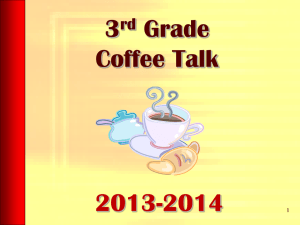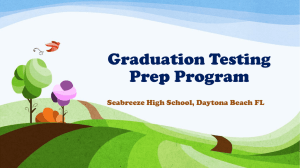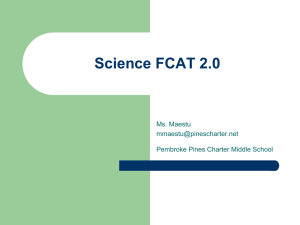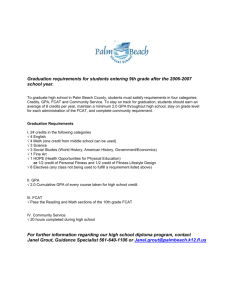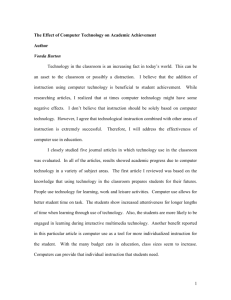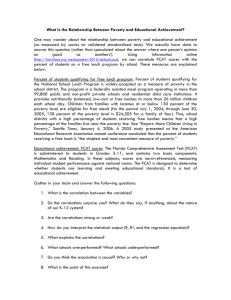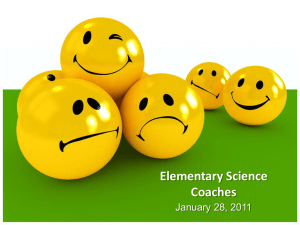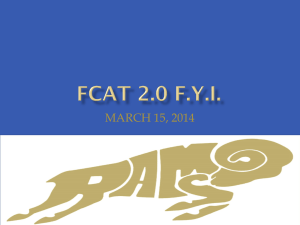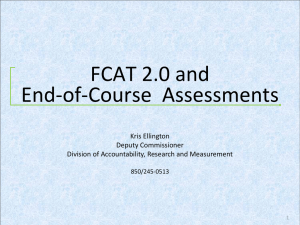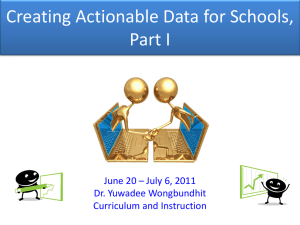Action Research Project: Every Teacher is a Writing Teacher
advertisement
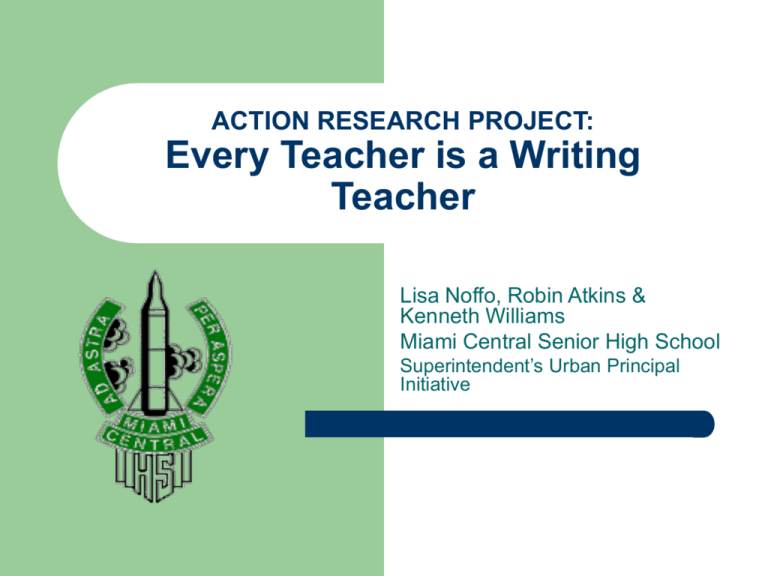
ACTION RESEARCH PROJECT: Every Teacher is a Writing Teacher Lisa Noffo, Robin Atkins & Kenneth Williams Miami Central Senior High School Superintendent’s Urban Principal Initiative Abstract of the Study The focus of this action research is to improve the writing test scores at Miami Central Senior High School. 3 strategies were used: 1. 2. 3. Team teaching which served as a professional development tool for non-language arts teachers. An eighth period writing course was implemented for all 10th grade students. Writing across the curriculum was implemented in all core and elective courses. Introduction/Background The major concern at Miami Central Senior High is that students are having difficulty mastering the writing process. The researchers believe that as a result of student difficulties and limited foundational writing skills our students demonstrate a lack of proficiency in writing semantics. Our goal is that Miami Central High School students will acquire writing skills which will result in an improvement in the writing process. Background Information Miami Central Senior High School was built in 1959 and resides on 95th Street and 17th Avenue. MCHS has 115 classrooms and utilizes 16 portable classrooms. Approximately. Student background information – 82% of the student population is Black non-Hispanic – 17% of the student population is Hispanic – 1% of the student population is White non-Hispanic – Less than 1% Asian/Indian Multicultural – 17% of the student population is enrolled in the Exceptional Student Education program – 5.5% of the population are Limited English Proficient Students(ESOL) – 60% of the students are on free and reduced lunch. Research Question How will team teaching, writing across the curriculum and an intensive 8th period writing curriculum improve writing scores? Literature Review 1. 2. 3. Kelly, Melissa, “Writing Across the Curriculum,” – http://712educators.about.com/cs/writingresources/a/writing.htm This article was chosen because the author discussed many strategies that can be used to improve writing skills in tenth grade students. Most importantly these strategies were ones that could be used in all content areas. Theses strategies were most useful to our non-language arts teacher. Team Teaching - : The Northern Nevada Writing Project Teacher-Researcher Group Paperback) http://www.todaysteacher.com/TeamTeaching.htm This article was used because it addressed various items needed to facilitate a good collaborative team effort between two teachers. This article was based on the book Team Teaching , (Stenhouse Publishing, 1996). This book gives multiple models of successful team teaching. Writing Across the Curriculum and Writing in the Disciplines http://owl.english.purdue.edu/handouts/WAC/ This article was selected because in gave further insight on the need in writing in discipline areas. This article although focusing on the collegiate level, lead the researcher to various websites on topics that can enhance a writing program. Methodology/Intervention To implement our plan we paired all non-language arts teachers with a reading or language arts teacher. This was done in order to provide professional development to the non-languages arts teacher and broaden the scope of language arts instruction. It was our hope that the non-language arts teacher would model the type of instruction they are observing in their co-teaching class. Writing across the curriculum was infused in all classes through daily mandatory journaling. The “Academic Improvement Period” (8th Period) was used as an intensive writing course for all tenth grade students. The Health and Physical Education classes, which are predominantly 10th grade students, were used periodically as a writing lab. The Reading Coach facilitated the instruction to reinforce writing strategies. These interventions were consistently employed throughout the school year. Data Collection Tools used to collect the data: – – – Learning express prompts – various sample writing prompts given to students on a bi-weekly and quarterly basis in their language arts classes. Teacher surveys – given before and after the co-teaching model was put in place. Teachers were not receptive to the co-teaching strategy initially, but post surveys show that teachers, seeing the value in team teaching are willing to try it again for the 2006-07 school year. FCAT Writing scores – were used to gauge the improvement of students writing scores. The test was administered in March Data Analysis FCAT Writing Results - M ean Scores 6 5.5 5 4.5 Mean Score 4 3.5 3 2.5 2 1.5 1 0.5 0 1998 1999 2000 2001 2002 2003 Year 2004 2005 2006 2007 Findings/Results Based on the results of the FCAT Writing test, our students did not show improvement in their writing performance. The baseline data that we started with, 3.5 dropped to a 3.3. While increasing in the expository component by .1, MCSH lost .6 points in the persuasive component. FCAT writing expository FCAT writing Persuasive FCAT writing combined score 2006 3.4 3.0 3.3 2005 3.3 3.6 3.5 Conclusions, Recommendations, Implications, or suggestions for future action for yourself or others Conclusions: Our data revealed that more professional development and an increase in the rigor in the area of writing is imperative in order to yield satisfactory results, thus, meeting the state mandate. The state’s data showed a slight increase of .1 in expository writing, but a .6 drop in persuasive writing. Our data indicated that our students must be exposed to a wide range of current event topics in order to respond effectively in writing to higher order prompts. Conclusions, Recommendations, Implications, or suggestions for future action for yourself or others Implications and recommendations: Focus on higher level prompts in the persuasive writing component Continue with the team teaching model as a source of professional development and modeling Look at ways to enhance the writing instructional focus calendar. Continue to use the writing disc provided by the state. Employ a full time writing coach to model writing across the curriculum.
